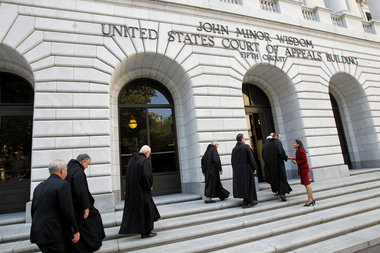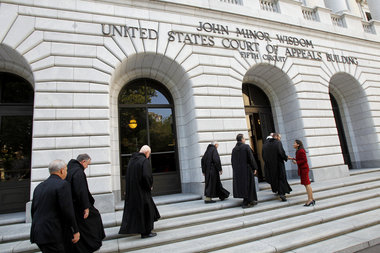Circuit Court of Appeals Asks Louisiana Supreme Court To Decide Monks Casket Case

Article Originally Published in the Memorial Business Journal
New Orleans – The U.S. 5th Circuit Court of Appeals has decided to send to the Louisiana State Supreme Court the state
funeral board’s appeal of a District Court ruling that the state’s law allowing only licensed funeral directors to sell funeral-related merchandise, including the sale of caskets, is unconstitutional.
Five years ago, the St. Joseph Abbey of Saint Benedict began selling its own handmade coffins for $1,500 to $2,000 to support the abbey, which invested $200,000 in a wood shop to make and sell the handmade caskets. The abbey was stopped when the Louisiana Board of Embalmers and Funeral Directors sent the monks a cease and desist order threatening them with fines and prison time, citing the state law that prohibits the sale of caskets without a funeral director’s license.
This case also highlighted an inconsistency in the interpretation of state laws. In November 2000, a federal judge struck down Mississippi’s law allowing only licensed funeral directors to sell caskets. In December 2002, the 6th Circuit Court of Appeals ruled unanimously to uphold a lower court ruling that Tennessee’s law stating that only licensed funeral directors could sell caskets was unconstitutional. Then, in March 2005, the 10th Circuit Court upheld a lower court decision in support of Oklahoma’s statute requiring a funeral director’s license to sell funeral merchandise.
In July 2011, the U.S. District Court for the Eastern District of Louisiana ruled that the state’s law allowing only licensed funeral directors to sell funeral-related merchandise, including the sale of caskets, is unconstitutional, which paves the way for the monks of St. Joseph Abbey of Saint Benedict to sell their handmade caskets.
U.S. District Court Judge Stanwood R. Duval Jr. said there is no rational relationship between requiring persons selling caskets to become funeral directors and to sell caskets only from funeral establishments. “The provisions simply protect a well organized industry that seeks to maintain a strict hold on this business,” Duval opined.
A month later, the Louisiana Board of Embalmers and Funeral Directors decided to appeal the decision. Lawyers argued before Judges Patrick Higginbotham, Catharina Haynes and Stephen A. Higginson from the 5th Circuit Court of Appeals in July, and their decision was filed October 23.
Now it will be up to the state’s highest court to determine whether state law gives funeral directors the power to regulate casket sales by those not in funeral service.
“Resolution of the statutory uncertainty surrounding the state board’s authority must come at the hand of the ouisiana Supreme Court, whose determination of state law is supreme,” Higginbotham wrote in the opinion.
“For generations, the abbey has made simple wooden caskets to bury its monks,” the opinion stated. “Public interest in
the abbey’s caskets increased after two bishops were buried in abbey caskets in the 1990s. Seeing potential in this demand, the abbey invested $200,000 in ‘St. Joseph Woodworks… The abbey offers no funeral services. It does not prepare a deceased for burial, and its monks do not participate in funerals, except as pastors.
“To be sure, Louisiana does not regulate the use of a casket, container or other enclosure for the burial remains,” the opinion continued. “Individuals may construct their own caskets for funerals in Louisiana or purchase caskets from outof-state suppliers via the Internet. Indeed, no Louisiana law even requires a person to be buried in a casket.”
The judges stated in the opinion that they “have doubts about the constitutionality of the state board’s regulation of
intrastate casket sales.”
“Our uncertainty is further fueled by the reality that the legislature, in crafting the statutory grant of authority in conformity with state law strictures imposed upon delegation of legislative powers, may have confined the authority of the state board to authority over its own industry – including funeral establishments, funeral directors and embalmers – instead of granting it broad powers to reach into other markets and regulate industry competition. In short, we question whether the state board’s regulatory power extends beyond authority to regulate the operation of certain actors – funeral establishments and funeral directors.”
“This decision is total vindication for the monks and a complete repudiation of the state board,” said Scott Bullock,
a senior attorney with the Institute for Justice, which represents the monks. “After losing twice, the state board and its friends in the funeral industry have one last hope: The Louisiana Supreme Court rules that the board has had the authority to go after the monks, the 5th Circuit then strikes the law down and the state board appeals to the U.S. Supreme Court.” Bullock argued the case in June before the 5th Circuit.
“Our prayers have been answered,” said Abbot Justin Brown, head of Saint Joseph Abbey. “Our confidence never wavered that justice would be done, and we are especially gratified that the court’s decision will protect the economic liberty of other entrepreneurs in Louisiana and around the country.”
Jeff Rowes, also a senior attorney with the Institute for Justice, said, “We expect the Louisiana Supreme Court to rule that Louisiana law authorizes the state board to regulate casket sales. The legislature twice rejected the abbey’s effort to amend the funeral law, making clear that the legislature has always understood the law to include the power to regulate the monks and other casket retailers. Occupational licensing laws are often pernicious precisely because legislatures write them so broadly, giving state boards enormous arbitrary power over the economic liberty of Americans.”
Added Rowes: “If Louisiana’s funeral law never authorized what the state board has been up to, then its members – almost all of whom are funeral directors who benefited financially from monopolizing the casket market – are going to have to answer serious questions about why they illegally spent so much time and taxpayer money causing needless misery to a tiny community of Benedictine monks and other casket entrepreneurs.”
Deacon Mark Coudrain, who is a plaintiff and who manages the abbey’s casket-making project, said, “America is as
much a land of economic liberty as it is a land of religious liberty. The court recognized that the U.S. Constitution doesn’t let the government prevent monks or anyone else from earning an honest living unless there is a really good reason, the kind of reason that was nowhere to be seen here.”
The federal case will now be stayed pending an answer from the Louisiana Supreme Court on the question that the 5th
Circuit Court posed. The 5th Circuit has set January 22, 2013, as a follow-up deadline.




